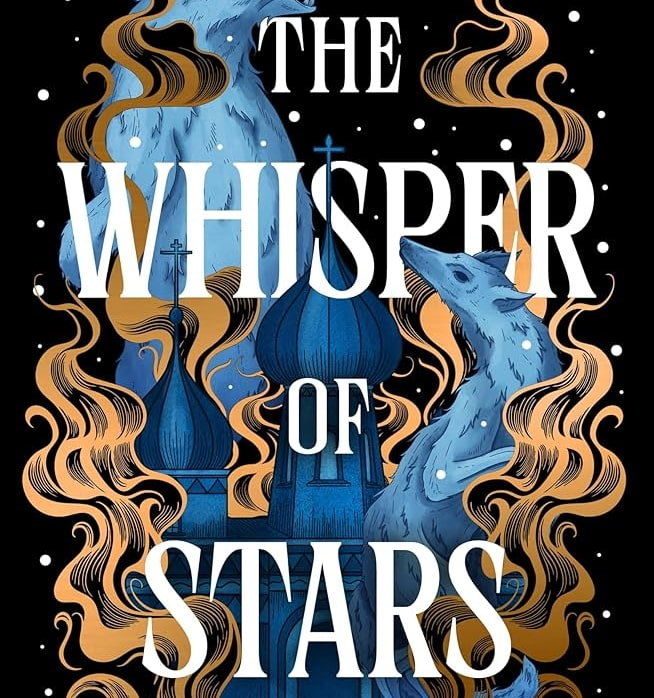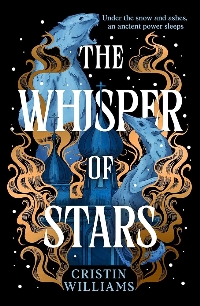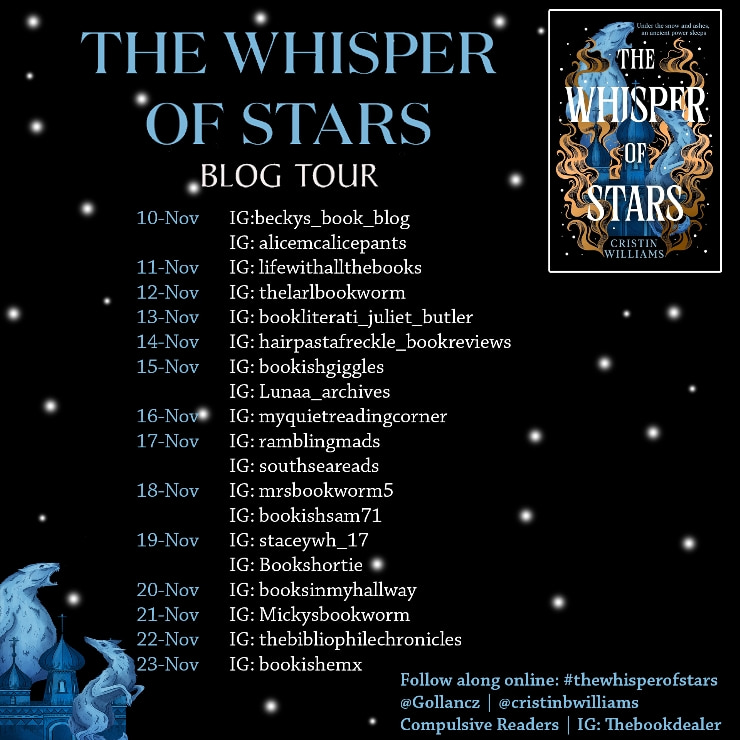Blog tour: The Whisper of Stars by Cristin Williams

This post is part of a blog tour organised by Compulsive Readers. I received a free copy of the book in return for an honest review.
‘A frozen island.
‘A monastery turned political prison.
‘A cipher inked in blood.
‘When anarchist poet Katya Efremova is transferred to the prison colony on Solovetsky Island, she finds an enigma among her returned possessions – a blood-stained book containing a cipher left by her murdered mother, written on the day she died.
‘Following her mother’s clues, Katya begins to unravel a centuries-old mystery woven into the history of Solovetsky Island. Finding the island’s legendary power might be the key to overthrowing the Bolshevik regime, but Katya wasn’t sent to Solovetsky by chance.
‘The head of the government’s spy network is watching, and there will be no hope of a free Russia if he takes hold of the magic hidden beneath the White Sea snow.’

The Whisper of Stars, by Cristin Williams, is an alternate history set in Russia in the early 1920s.
Young Katya Efremova is a charovnika – a subtype of volshebniki (magical folk) who use words to channel power from the Otherworld and affect change, both in the form of spoken spells and writing (poetry, in Katya’s case). She’s also an anarchist, and therefore imprisoned as a political enemy by the country’s new Bolshevik rulers.
The Bolsheviks fear and despise Katya and other volshebniki who don’t support them, but also see the potential to harness their powers to exert control over the population. Hence, Katya is initially imprisoned in a facility where she’s restrained by iron and subjected to distressing experiments, before being transferred to a monastery-turned-prison-camp on the remote Solovetsky Island.
It transpires that Katya’s mother, Svetlana (also an anarchist and charovnika, and murdered by the Bolsheviks not long before Katya was captured), made a trip to the same freezing archipelago a few years previously, where she came tantalisingly close to uncovering an extremely potent grimoire – and she’s left a number of coded clues to help her daughter complete her mission.
However, Katya isn’t the only person on Solovetsky Island – volshebnik or Bolshevik – who knows about the grimoire, and whoever gets hold of it first will thereby have the power to determine Russia’s political future once and for all.
The Whisper of Stars ticked so many boxes for me. Alternate history involving magic! An historical setting I particularly enjoy reading about! Folklore! Spells and rituals! Shapeshifters! Magic books and words! Mystical labyrinths! Coded messages! Dark secrets! Moments of extreme peril! I was hooked right from the start.
You’d be right in thinking that Katya’s particular brand of magic, and the sought-after grimoire, especially captured my imagination. Katya is not only able to draw on long-established spells, but can wield her own poetry as a supernatural weapon, way above and beyond changing hearts and minds with the sentiments she expresses.
Like its counterpart in The Great Deception, by Syd Moore, the grimoire contains words that can invoke and deploy magic, and is also a magical object in and of itself that would be extremely dangerous if it fell into the wrong hands. I just love the idea of words channeling power and bringing about change merely from being inscribed (yes, I did swoon over R. F. Kuang’s Babel), so The Whisper of Stars really won me over in that respect.
As indicated above, Katya is far from the only volshebnik in the prison camp. Her co-conspirator (once she overcomes the fact that he’s an aristocrat) Dima is a skomorokha: a member of an ancient bloodline whose ancestors swore an oath of kinship with bears, and one of the small proportion of whom are able to transform into bears.
In addition to wanting to help Katya look for the grimoire because he’s into her, and doesn’t want the Bolsheviks finding and using it, Dima has a personal motivation: the book features in family stories that have been passed down to him, and even shape his dreams. I found Dima’s lore – both the skomorokha origin story and the more recent activities of his forefathers, and how they relate to Solovetsky Island’s past as a monastery – fascinating to read.
In fact, Katya and Dima are both compelled to track down the grimoire by duty to their families, to some extent. For Dima, this is straightforward: his whole family were shot by anti-Cossacks in the wake of the Revolution, and this is something he can do to honour his beloved relatives.
Katya’s mother Svetlana, we learn, was disinterested in her daughter until Katya’s magical abilities started to show, at which point she became interested – in how she could use them to further her political cause. Katya therefore experiences conflict between the possibility of finally managing to please her mother (who very much lives on in her psyche), and questioning why she should continue the work of someone who almost never had a kind word to say to her.
Another gifted prisoner who’s very interesting to read about is aristocrat Natasha, a vedma – a woman who uses rituals, potions, and music to draw and direct magic from nature – who instantly takes against Katya, and also seeks the grimoire, ostensibly on behalf of the Bolshevik camp chiefs who believe they, not she, are pulling the strings.
Gratifyingly – and despite her intentions to close herself off, so she can’t get hurt – Katya does make friends among the many women in her barracks, principally Tsisana, a Georgian countess and kolduna (a woman with a healing touch and extensive knowledge of remedies). The interactions the prisoners have with one another are often touching, and not infrequently amusing, which warmed my heart.
One criticism I do have, though, is the lack of overt queer rep. It feels like a missed opportunity, in an alternate history where the characters sleep in barracks segregated by gender, not to have at least one same-sex relationship take off. Plus, I’m pretty sure “magical lesbians”, even as a minor subplot, could only increase this book’s appeal for LGBTQIA+ fantasy readers.
The Whisper of Stars is absolutely captivating.
